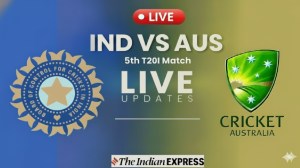Archery: 32 Football: 14 Athletics: 15 Rowing: 20
A year ahead of the the Olympic Games in Athens, the prospect of medals for Indian sportsmen looks increasingly bleak. It’s been that w...

A year ahead of the the Olympic Games in Athens, the prospect of medals for Indian sportsmen looks increasingly bleak. It’s been that way for years now, although you might not have noticed it amid the flurry of self-congratulatory activity in the afterglow of the Commonwealth Games and the Asiad.
That’s the sad story of Indian sport, which — barring, to an extent, cricket — has excelled at underachieving. Discount the eight hockey golds and the tally of Olympic winners is blank. Even hockey medals have dried up since Moscow, 23 years ago.
There are several reasons for this, enough to fill several books, but the one we are focusing on in this series, is the role of the men at the top. As the list on today’s front page indicates, most sports in India have been controlled by the same men for years, in one case all of 32 years (we’ll overlook, for now, the fact that so few of them have had any personal contact with the sport they run).
This obviously sidesteps — or bulldozes through — the principle of accountability that is necessary to run any system. Government guidelines stipulate that no person shall occupy any post in the federation for more than two terms (each term for four years) but they obviously haven’t publicised that particular rule.
However, their own lack of accountability hasn’t prevented those at the top from exercising it vis-a-vis their juniors. KPS Gill demanded accountability from his coach and sacked him in midst of the World Cup on the hockey team’s debacle. But neither Gill nor any other official has ever deemed it fit to accept responsibility for India’s long barren run at the Olympics.
Indian judokas have never come anywhere near the Olympic podium but Jagdish Tytler remains probably the longest serving head of a national judo federation anywhere in the world. His performance earned Tytler the job of chef de mission of the Indian contingent to the 2002 Asian Games held in Busan.
And Vijay Kumar Malhotra has long stopped hitting bulls eyes; his 32-year stint as head of the archery federation has been unremarkable save the brief rise of Limba Ram. Anyone knows what happened to Limba and his ilk?
The only progress made by these federations is in seeing their heads move on to bigger things. Randhir Singh, secretary-general of the Indian Olympic Association, has got for himself a nice post at the World Anti-Doping Agency — which partially explains why more doping cases are coming to light in India, although no action is being taken against officials.
Over the next few days, this paper will try and bring to light some facts about how the different federations have flouted the principle of accountability. There is no guarantee that it will change things, simply because things in India have developed a great resistance to change.
But it may prompt the government, the biggest referee of all, to take a fresh look at how sports is run in India. And maybe then we’ll see light at the end of the tunnel.



- 01
- 02
- 03
- 04
- 05




























